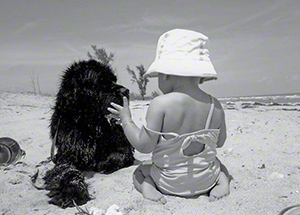How many times have you turned on the news to watch coverage of an earthquake, flood, fire or other disaster? Families left homeless, pets left to fend for themselves. What if it happened to you? Who would take care of your dogs or other pets? In a time when emotions run high and your world has turned upside down, the steps you take now to be prepared may be your saving grace.
I grew up in southern California, the land of earthquakes, fires and floods. I've never forgotten the day the sky stayed dark the entire day, the sun obliterated by the thick smoke of several canyon fires and a mountain on fire. Ashes fell from the sky like snowflakes. I was nine years old. Clothes were packed, photo albums and important documents placed by the door. I went to bed that night knowing that if the fire jumped the freeway we would have to evacuate. The wind direction changed and the fires continued in a different direction but I'll never forget my mother going through the house taking irreplaceable items and setting them next to the front door.
Tip # 1: You may have little or no warning to gather your belongings and escape. Whether you have one dog or 20, you should have an emergency plan. Designate two out of-state contacts to supply with instructions, phone numbers and addresses of pertinent relatives and friends who must be notified. The reason for two contacts is that one of these people may be unavailable. With one phone call you can put your emergency plan in to effect.
COMMUNICATION: In the event of a natural disaster, the phone service in your area may be sporadic at best. Local circuits may be busy but calls from out of state are able to reach you. You can also use your cell phone. Make sure your contacts have the phone number.
Tip #2: Remember you may have nothing available to refer to such as a list of phone numbers or addresses so make sure your contacts have the necessary information to help you.
FOOD & WATER: Keep extra bags of dog food and canned food on hand. Rotate the stock using the older food first. Prescriptions should be kept filled and a first aid book and kit for both dogs and humans should be kept in a central location. Water can be stored in large containers. You can also purchase water purification tablets at sporting goods stores to keep on hand.
Tip #3: Don't forget that you can also fill the washing machine. This water can be used to flush toilets or for bathing.
Disaster Preparedness Check List
DOGS: If you have several dogs, who will take care of them? You may need to have dogs distributed between several dog friends. Special needs, veterinarian information and medications will need to be addressed. Depending on the emergency, you may have local friends who can step in to help you. There should be a person to contact on that list who can take charge of your dogs or delegate where the dogs should go. In fact, they may have to arrange transportation to get your dogs and it could be weeks before you are able to get your dogs back with you.
What they eat, medications, veterinarian, their name and call name should be some of the information supplied. This information does not need to go to the contacts but to whomever you have designated to be in charge of your dogs. If you have several dogs or a kennel, have at least one central person with the dog information. This person can then relay the pertinent facts to others who may need to house your dogs for you.
Tip #4: Make use of your NCA roster or regional club list. Download the iPhone or Android version of the NCA Membership app to keep on your phone
IDENTIFICATION: A house fire can destroy all of your belongings. A flood or tornado can leave behind much destruction. Important documents or copies will give you a starting point. Create a folder for each of your dogs. Original AKC registration, pedigree, identifying photos, written identification such as champion Blah Blah Blah is a spayed bitch. Microchip number AB1234. She has black spots on her tongue and her call name is Blah. Keep the folders in a fireproof file or safe deposit box. In the event of a disaster you may become incapacitated or even die. Having each dog identified will make the process smoother for whomever takes charge of your dogs.
Individual Dog Identification Form
Tip #5: Make sure your file is current with vaccine and medical records. Mark your calendar to do this yearly such as at tax time or when heartworm meds are started.
Tip #6: Keep your gas tanks full. In the event of an emergency you do not want to have to stop and fill the car with gas.
Tip #7: Keep some cash on hand. Banks may be closed; ATM machines may not be functioning.
Tip #8: In the event of an evacuation shelters will usually NOT take animals of any kind. Your veterinarian may also be in the same predicament. Have a back up plan.
Tip #9: You may wish to have a large cabinet centrally located in your home stocked with emergency supplies. Contact the American Red Cross for disaster planning preparedness guides.
Tip #10: Plan ahead how they would travel if you would have to have all your dogs transported. Can one vehicle transport all your dogs? Do you have enough crates? What if bitches are in heat? Who can you call on to help you?
Tip #11: Emergencies are not convenient. What will you do if there is a disaster and you are not at home? Roads may be closed and you may not be able to get home quickly. Is there someone you can call that may be able to get to your home and take care of your dogs?
Emergencies are not planned BUT you can plan for an emergency.
reprinted from NewfTide 2001

